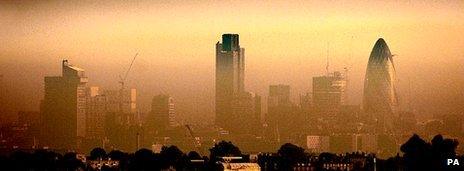Boris Johnson sticks by gluing pollution to roads
- Published
- comments

It sounds like the sort of idea he might have come up with on the satirical TV shows he frequented before becoming London Mayor. But Boris Johnson is serious about gluing pollution to roads.
For the past few months a fleet of specially adapted gritting lorries has been spraying adhesive on some of London's pollution hotspots in the middle of the night.
The idea has been that the calcium-based solution will stick pollution in the air to the road.
London mayor Boris Johnson has called them "wonderful contraptions" which tackle air quality head-on.
But others aren't quite as convinced.
Prof Frank Kelly of King's College London says the technique is a "waste of public money".
"This does not deal with the problem at source," says Prof Kelly, an expert on the impact of atmospheric pollution on human health.
"The moment they stop the spraying, the problem arises again."
The fleet of three lorries is patrolling 19 miles (30km) of roads with some of the worst pollution, including Victoria Embankment, Earl's Court Road, roads leading to the Blackwall Tunnel and in the Euston area.
Between midnight and 06:00, the roads are first swept and jetwashed by a machine similar to a road dust sweeper.
Then a solution of calcium and water is applied by a modified winter gritting machine with a very fine sprinkler-like system attached. Once it settles it is hardly visible.
The aim is to stick tiny sooty particles called PM10s to the road. PM10 is produced by exhaust fumes as well as tyre and brake wear and can cause asthma, cardiovascular problems, lung cancer and premature death.
It is the first time such a technique has been tried in the UK.
Critics say it is a sticking plaster solution designed to avoid fines of up to £300m for failing to comply with EU air quality standards.
"As a health research scientist I am just aghast that they are trying to hide the problem in this way from the European Commission," says Prof Kelly.
Earlier this year air pollution in London hit its highest level since 2003 according to official figures.
The city will be in breach of EU pollution standards in 2012 if there are more than 35 "bad air" days, after which further action can be taken by the European Commission.
'Snort'
The Green Party claims it's no coincidence that the one air monitoring station used by the mayor Boris Johnson to report to the Commission is on one of the routes being sprayed.
"They are cheating, making it look as if targets are being met when they are not with the use of this road glue," said Jenny Jones, a Green member of the London Assembly.
"Pollution is a problem all over London not just in a few streets."
When she confronted Boris Johnson over the issue earlier this year he was dismissive.
"The point about this substance is that whilst it is taking particulates out of the air it is making them impossible for you to ingest or to inhale," he said.
"And that means it is reducing pollution - unless you bend over get down on all fours and snort it."
Garrett Emmerson, chief operating officer at Transport for London also defended the gluing pollution scheme, one of several methods being used to combat pollution.
More than £900,000 is being spent on the scheme, he says, and trials have shown it has led to a 14 per cent drop in particulate pollution at hotspots.
"A key priority for the Mayor and TfL is to deliver cleaner air for London through long term measures such as introducing low emission vehicles, using cleaner buses, banning the most polluting taxis and tightening the low emission zone standards, as well as immediate measures agreed with the Department for Transport," he says.
"These include discouraging engine-idling, installing green walls and planting trees to absorb pollutants, as well as innovative dust suppressant technology."
- Published13 July 2011
- Published21 April 2011